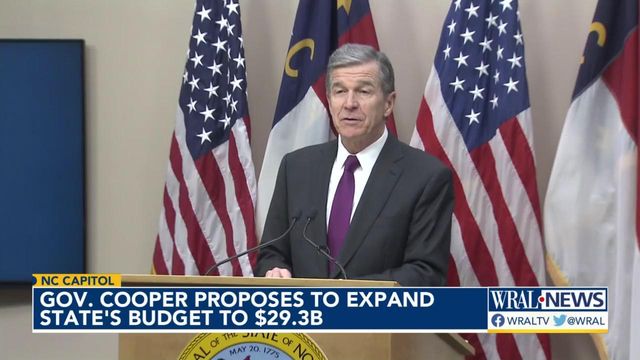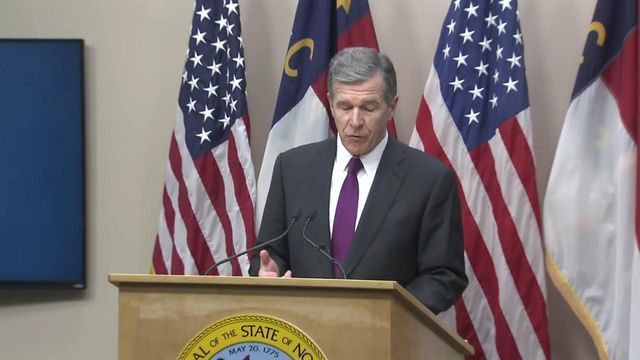Gov. Cooper proposes to expand state's budget to $29.3 billion, increasing investment in teachers, public safety
Initially, the state was planning on spending $27 billion for the 2022-2023 fiscal year, but Cooper wants to increase that to $29.3 billion.
Posted — UpdatedInitially, the state was planning on spending $27 billion for the 2022-2023 fiscal year, but Cooper wants to increase that to $29.3 billion.
Investment in education
Raising teacher salaries
The governor is recommending half a billion dollars to be distributed to North Carolina public schools, including increases for teacher salaries.
The state had budgeted for teachers to get 2.5% raises in 22-23. Cooper wants to double that, giving teachers 5% in 23-24 and to add another 2.5% to proposed raises of 5% in 23-24, according to State Budget Director Charlie Perusse.
Under the current budget signed into law in November, the starting salary for North Carolina teachers is $35,950. Cooper is proposing increasing that to $36,600.
Cooper is also recommending an additional $3,000 total bonus for educators and school-based administrators next year. The first payment would be distributed on Nov. 22 and the second on April 23, 2023.
In total, Cooper's suggested budget hopes to allocate a one-time payment of $863 million toward keeping and retaining state employees and $691 million in reccurring payments for state employees.
'Ensuring a sound and basic education'
Along with increasing educator pay, Cooper is aiming to create a "skilled educator pipeline" to ensure that students in North Carolina have quality teachers. $19.9 million of the more than half a billion allocated to public schools would go to low-performing schools and districts under Cooper's plan.
The state would also be increasing funding to early childhood education under the governor's proposed budget.
Assistance to homeowners, renters
First-time homebuyers who make less than the state's median income will be eligible for assistance in making a down payment, according to the governor's proposed budget recommendations.
Cooper wants to give educators, sworn law enforcement officers, firefighters and other first responders $15,000 each in assistance to pay for a new home.
The governor also wants to help low-income families with their rental payments and energy bills under the new proposed budget.
Medicaid expansion
Cooper's budget proposal expands Medicaid benefits to an additional 600,000 more North Carolinians. He said that expanding access would bring the state an increase in "economic activity, which translates to greater state and county tax revenues."
Medicaid expansion in 22-23 would not require state funding, Cooper pointed out.
Improving public safety
Cooper hopes to increase funding for law enforcement agencies to improve public safety. The state would give out $10 million for body cameras in select counties under the proposed plan.
$20 million of public safety funding would go to school safety and mental health training. $1.2 million would go to sheriff's offices to help promote safe gun storage and gun locks.
The governor recommends that more funding go toward the North Carolina Division of Juvenile Justice to help create a program to prevent crime among teens.
Lawmakers, educators respond
North Carolina Speaker of the House Tim Moore said that while the governor's proposed budget increase includes "several shared priorities" with the Republican Party, they are "wary of excessively spending in the face of potential economic downturns.
As leader of the House's Republican majority, Moore will have a lot of say on the budget that ultimately passes the General Assembly. And while Republican lawmakers are likely to go along with some of Cooper's suggestions, they can, and almost certainly will, craft their own budget.
“We look forward to working with the Governor and members of the General Assembly on both sides of the aisle to put together a bipartisan budget for all North Carolinians," Moore said in a statement.
Educators praised Cooper's proposed bill for focusing on students and disadvantaged school districts.
"Our hope is that the final budget signed into law reflects the priorities of educators and needs of students across North Carolina," said president of the North Carolina Association of Educators Tamika Walker Kelly.
Cooper says approved budget was 'imperfect'
"I will sign this budget because, on balance, the good outweighs the bad," Cooper said at a news conference in November, shortly before the state Senate took the first of several votes needed to finalize the budget. "Our schools, our communities, our small businesses [and] our families need our help right now."
A comprehensive budget hadn’t been in place since 2019 because of a negotiating impasse that year by Cooper and the Republican legislative majorities.
The legislative session begins next week.
Related Topics
• Credits
Copyright 2024 by Capitol Broadcasting Company. All rights reserved. This material may not be published, broadcast, rewritten or redistributed.






